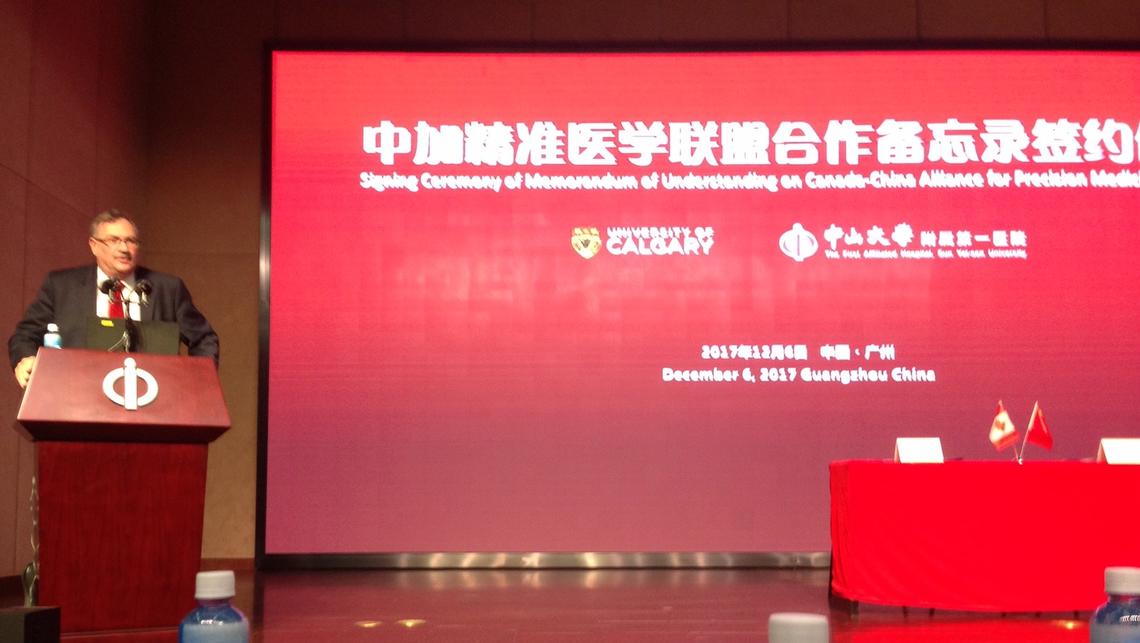Dec. 7, 2017
University of Calgary signs Canada-China Alliance for Precision Medicine

From left: Jon Meddings, John McCallum, Xiao Haiping, and Bin Hu.
The University of Calgary’s Cumming School of Medicine (CSM) and Sun Yat-sen University in Guangzhou city, Guangdong, China, are collaborating to create intellectual exchange opportunities for students, faculty and staff through research and development projects that will benefit patients with unmet medical needs in both countries.
Through the Canada-China Alliance for Precision Medicine (CCAPM), researchers are sharing knowledge and developing medical technologies to improve the quality of life for people with neurologic (brain) disorders now, and in the future.
The CCAPM centre will be located in Calgary. The first priority will be the development of an artificial brain called “NeuroDarwin” that will be used to predict progression of neurological diseases and optimize their treatment options. In order to reach these goals, the first step will be to refine development of a second generation of wearable medical devices for the care of patients with Parkinson’s disease.
UCalgary researcher Dr. Bin Hu pioneered the wearable technology.
"Unlike other disciplines, adaptation of artificial intelligence and big data in medicine faces some unique challenges in data collection, quality, accessibility and consistence across different patient populations. The new generation of wearables to be implemented within CCAPM global network permits a new data collection model that will be transcending the limitations of culture, countries and patient populations," says Hu, professor in the Department of Clinical Neurosciences at CSM.
This inaugural project will not only benefit academia here and in Guangdong, China, but will also boost the Alberta economy as two Calgary companies will manufacture the devices. These companies currently employ 20 people and it is anticipated that this project will lead to the hiring of 30 additional staff, as well as other opportunities.

Cumming Dean Jon Meddings at the signing ceremony in China.
Key to the project is the TianHe-2 supercomputer based in Guangzhou that has the world’s fastest computer grid. The computer will translate data provided by patients with Parkinson’s and other neurological diseases who are wearing the second-generation medical devices. Information gathered by these devices will feed into NeuroDarwin, the world’s first digital brain consisting of millions of interconnected “neurons.” This state-of-the-art data collection system combined with machine learning algorithms will be applied to assist in the health care of individual patients to instantaneously deliver the best drug therapy regimens for individual patients.
“This project has the potential to deliver precision medicine to patients on a global scale,” says Dr. Jon Meddings, dean of the Cumming School. “It’s something that never could have been realized without this collaboration.”
Neurologic diseases are projected to be the most costly health-care item on societal budgets, surpassing the current leader, cardiovascular disease, within the next 15 years.
Cities in the province of Guangdong are facing a rapidly aging population with greater than two million patients who will benefit directly from the research and development activities of the CCAPM. Health, medicine and life sciences provide fertile areas of tremendous opportunities for the CCAPM to collaborate globally with the best minds in the world in fostering cutting-edge research, technology development and commercialization.
Bin Hu is also a professor in the Department of Cell Biology & Anatomy at CSM, a member of the Hotchkiss Brain Institute and an associate member of Alberta Children’s Hospital Research Institute.
